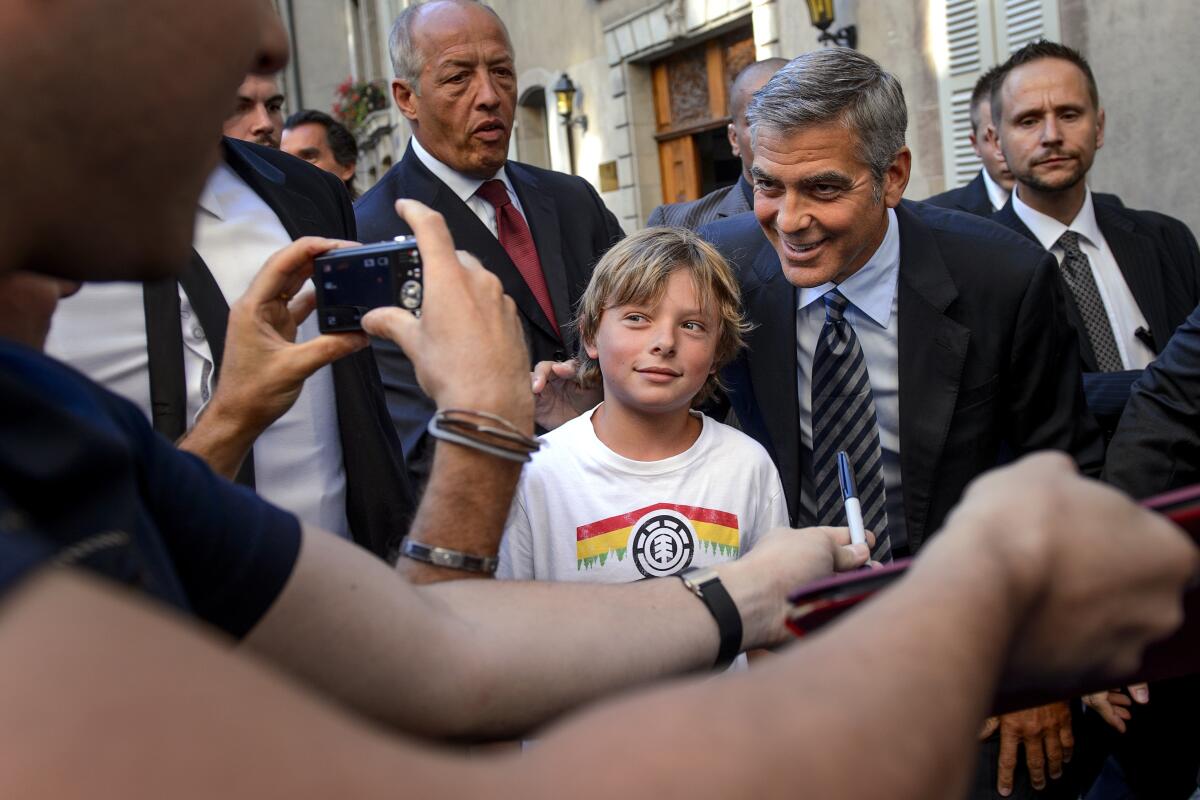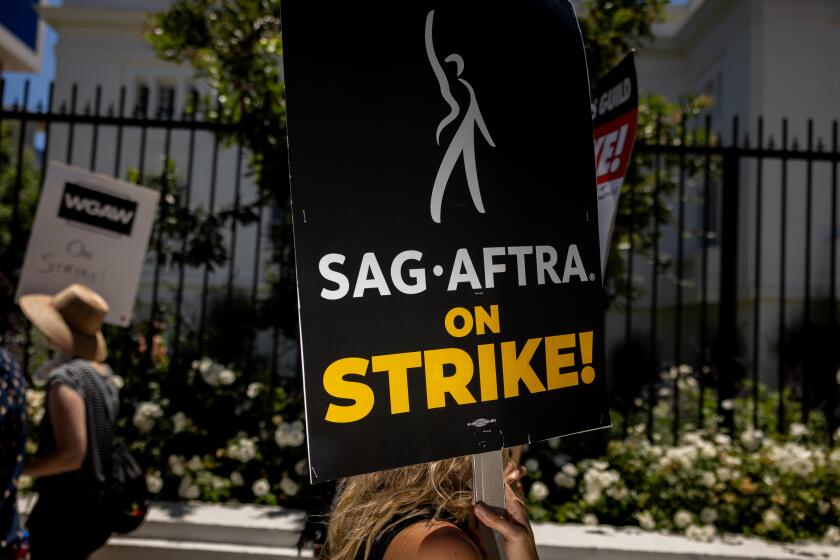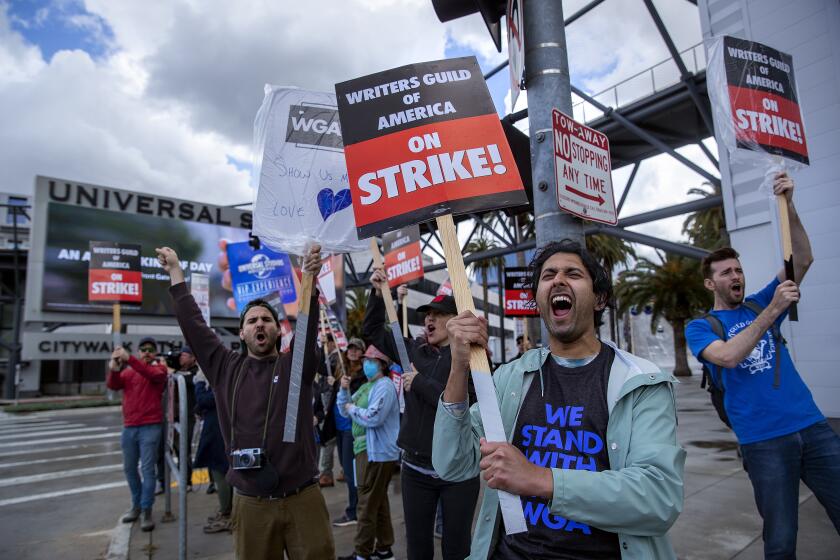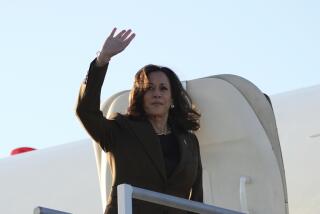Why Hollywood political donations are due to spike

- Share via
Hollywood political donations, sharply stymied by this year’s drawn-out entertainment-industry strikes, are expected to spike now that the Screen Actors Guild has reached a tentative deal with the studios.
President Biden is widely expected to raise money in Los Angeles in the coming weeks, along with a slew of Senate and congressional candidates who have largely avoided the region because of the writers’ and actors’ strikes.
Biden and Vice President Kamala Harris, a Californian with longtime relationships with entertainment-industry leaders, have been largely unable to publicly tap these donors this year. Harris in May even pulled out of her first public appearance in her home state after she and Biden announced their reelection campaign — an MTV mental health awareness event in Carson — because of the Writers Guild of America strike.
Attending a glitzy industry fundraiser would have been even more fraught — Biden or Harris would have almost certainly had to cross a union picket line — an anathema in Democratic politics, where support from organized labor is essential. Additionally, studio executives didn’t want to host fancy donor gatherings or write big checks while they were pleading poverty during bargaining with actors and writers.
SAG-AFTRA has approved a deal from the studios to end its historic strike. The actors were on strike for more than 100 days.
Biden and Harris have by no means suffered because of the decline in the number of Los Angeles fundraisers. They have raised more than $70 million in each of the last two fiscal quarters, and their campaign and the Democratic National Committee have $91 million cash on hand, the most ever by a Democratic White House ticket at this point in the electoral cycle.
Still, campaign manager Julie Chávez Rodriguez said the president and vice president purposefully avoided Hollywood because of the strikes.
“We have been very respectful [and] mindful of the environment that people in the industry are feeling and facing,” she said in an interview shortly before the actors’ strike was resolved. “I hope we get a chance to get out there before the end of the year, the end of the fourth quarter, because it is a really important base of support for us to be able to connect with before the clock starts over.”
Biden on Thursday lauded the tentative agreement.
“Collective bargaining works,” he said in a statement. “When both sides come to the table to negotiate in earnest they can make businesses stronger and allow workers to secure pay and benefits that help them raise families and retire with dignity.”
The entertainment industry has been a historic treasure trove of political dollars for both parties, but mostly Democrats. In 2020, people who reported working in television, movie and music jobs donated $43.7 million to presidential campaigns and outside groups.
Democrats received nearly three-quarters of the money, according to an analysis of Federal Election Commission data by the nonpartisan, nonprofit Center for Responsive Politics, which tracks electoral finances.
Hollywood’s twin strikes translated into a lost year of production for much of the industry with productions idle since last spring. SAG-AFTRA’s strike against major media companies stretched 118 days.
Political contributions from donors who work in the television, movie and music industries plummeted this year, according to an analysis by the center conducted for The Times.
In the first nine months of 2023, donors in these industries contributed $5.4 million to federal campaigns, according to the center’s analysis. During the same time period in prior presidential elections, these donors contributed much more: $24.6 million in 2019, $21.1 million in 2015 and $15.5 million in 2011.
One of the most famous Hollywood fundraisers took place in 2012 on the basketball court of actor George Clooney’s house in Studio City, when then-President Obama raised nearly $15 million for his reelection effort, believed to be the largest one-night campaign haul ever at that time. The dinner party, catered by Wolfgang Puck and attended by Robert Downey Jr., Diane von Furstenberg, Barbra Streisand, James Brolin, Tobey Maguire, Billy Crystal and others, took place one day after Obama announced his support for gay marriage.
Such star-spangled events were few and far between in summer. The tempo has started to pick up slightly in recent months, though it’s still slower than the typical slate of political galas, fetes and dinners the year before a presidential election, several people said. In addition to providing an opportunity to publicly tout one’s political views, such events are a cornerstone of the Hollywood social scene.
“Fundraising in Hollywood is the ultimate networking,” said Donna Bojarsky, a longtime Democratic political consultant and co-founder of a nonprofit dedicated to building civic engagement in L.A. “You go to a Hollywood fundraiser and you see everyone you know.”
However, some are skeptical about whether entertainment-industry fundraising will return to its prior apex.
Lara Bergthold, a communications consultant who has long operated at the nexus of Hollywood and politics, identified a wider issue than the labor stalemate and ensuing financial losses.
“Looking at the broader landscape of progressive organizations and candidates, fundraising is down for them compared to this time four years ago — it’s not just Los Angeles, it’s not just the strike, it’s kind of all over the place,” she said, citing donor burnout, exhaustion and wide-ranging economic worries.
Still, there was a class of major donors who’d largely abstained this year because writing five- or six-figure checks “felt flashy and showy at a time when it was really much more appropriate to be holding back,“ she said recently. Bergthold expected that giving to resume in full force soon after the SAG-AFTRA strike ended.
The writers’ strike ended in late September after 148 days, and the actors’ union’s negotiating committee approved a tentative deal with the major studios on Wednesday after a nearly four-month strike that hobbled the industry and left thousands without work. The ratification vote is expected to take place this week.
The 2023 WGA strike lasted 148 days, making it one of the longest work stoppages in Hollywood history. Why did it last so long?
Speaking last week before the SAG-AFTRA strike ended, Jay Sures, the politically powerful vice chairman of Hollywood’s United Talent Agency, said he was uncertain about how fundraising would play out in coming months.
“I think it’s going to be a mixed bag,” Sures said. “You’ll see super mega donors who are just going to give no matter what, and you’ll see other donors who will say, ‘Maybe it’s time to just hold off for one beat and see where the world takes us.’”
Gov. Gavin Newsom, who has benefited greatly from Hollywood donors, said he expects it may take a little time for fundraisers to ramp up because of the roller-coaster many have been through recently.
“I think everyone takes a deep breath. It’s been a tough three years for all of us, with COVID, social unrest, macroeconomic uncertainty, issues of geopolitical uncertainty. And now you have these strikes,” Newsom said this month. That said, he added, “the economy has done very well for a lot of those folks — Bidenomics has been good to them. I would expect that largesse to show up in subsequent quarters, undoubtedly.”
More to Read
Get the L.A. Times Politics newsletter
Deeply reported insights into legislation, politics and policy from Sacramento, Washington and beyond. In your inbox three times per week.
You may occasionally receive promotional content from the Los Angeles Times.















